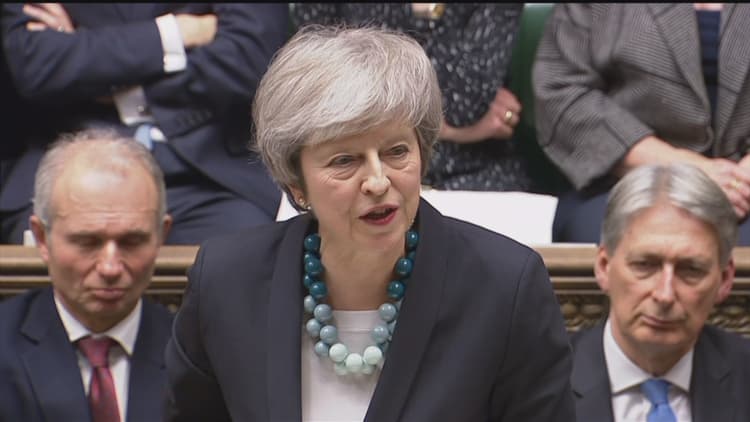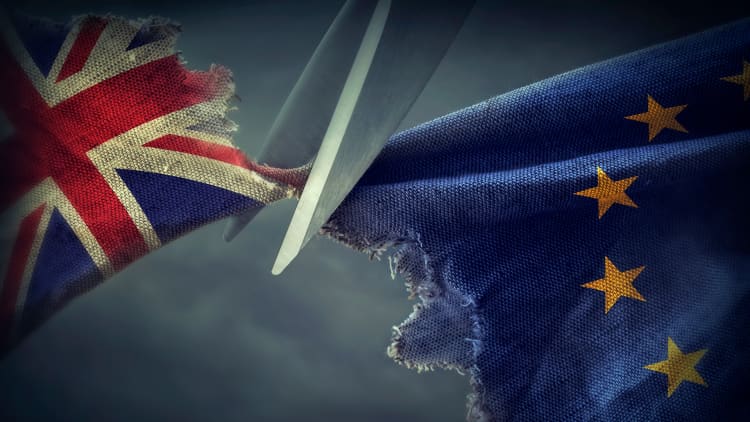
A Brexit vote in U.K. parliament has been delayed by Prime Minister Theresa May, following fears that the British government was headed for an embarrassing defeat.
The move was confirmed in a statement by May to lawmakers in the House of Commons on Monday afternoon.
May claimed that while there was broad support for her deal, the issue of the Northern Irish backstop remained a concern and she would return to European counterparts to renegotiate the deal.
"I will hold emergency talks with EU leaders to discuss possible changes to backstop," May said before adding that Brussels were open to further discussions on the matter.
The U.K. leader defended her original proposal saying she was in "no doubt that this is the right Brexit deal." May also warned that those who wanted to promote a second referendum, must "be honest on the risk of dividing the U.K."
She then warned those who wanted to leave Europe with no deal, to be equally honest on its impact upon the poorer areas of Britain.

The climb-down will be seen as a failure on the government's part to persuade enough lawmakers that the draft Brexit deal with Brussels is the best possible arrangement.
At the start of her statement, sterling was at $1.2640 versus the dollar and fell to $1.2563 as she spoke. On the day sterling was lower by 1.2 percent.
In response, the leader of the U.K.'s main opposition Labour Party, Jeremy Corbyn, said it was clear that the government had "lost control of events and is in disarray."
Corbyn added that May was "trying to buy herself one last chance to make a deal" and that if she couldn't then she should resign from her post.
In one moment that appears to undermine May's move, the House of Commons Speaker John Bercow told the Commons that any minister could move that the debate be adjourned — giving MPs a chance to vote on whether or not the vote itself should be pulled.
Back to the backstop?
One contentious element of May's deal is a clause in the withdrawal deal known colloquially as the "Irish backstop." This arrangement would ensure no hard border is erected between Northern Ireland and the Republic of Ireland, even if no formal Brexit deal can be reached.
It would mean Northern Ireland could stay in the customs union and select parts of the EU's single market, therefore continuing a friction-free border with the Republic of Ireland.
But lawmakers from different parties fear that without an agreed time limit, or a unilateral right by the the U.K to the end the clause, it could be used as leverage to keep the whole of the U.K. under EU rules until Brussels decides otherwise.
They have said they will continue to oppose May's draft deal with Brussels unless she can either remove the backstop or put a time limit on its effectiveness.
Some opponents to May's deal also want her to gain stronger commitments on the U.K.'s ability to strike a free trade agreement with the EU, release Britain from EU courts and stop payment of an agreed £39 billion "divorce bill."
But European Council President Donald Tusk said on Monday that the EU would not re-negotiate the Brexit deal. Tusk said he was calling a meeting for Thursday of the EU's member states to discuss "preparedness" for a "no-deal scenario".
Britain is set to officially exit the European Union, deal or no deal, on March 29, 2019 – just a little over 3 months away.
I have decided to call #EUCO on #Brexit (Art. 50) on Thursday. We will not renegotiate the deal, including the backstop, but we are ready to discuss how to facilitate UK ratification. As time is running out, we will also discuss our preparedness for a no-deal scenario.
What is the Meaningful Vote?
The now-delayed vote in the House of Commons is termed the "meaningful vote" and is to allow lawmakers to have their say on the terms of Brexit that the EU and British government had previously agreed.
May's motion that she seeks parliamentary backing for includes a "withdrawal deal" that outlines the divorce and a "future relationship" document that spells out the areas of negotiation that we needed to resolve how the EU and U.K. will interact in future.
May has claimed it is the best deal she could get to satisfy a deeply divided country which in June 2016 voted 52 percent to leave and 48 percent to remain in the EU.
But MPs from all sides of the British political spectrum have publicly refused to back the deal. Her deal with Europe is seen by some as a sell-out to the ideals of Brexit, reducing Britain's influence while staying within many of the EU's rules.
And many of those who oppose Brexit didn't like the deal either. They have argued that it will reduce Britain's ease of trade with the world, repel global talent, and increase the cost of living.


